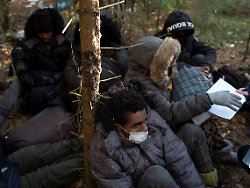Thursday, October 28, 2021
Talk about refugees at Lanz
“Competition of brutality” at EU borders
By Marko Schlichting
For weeks, more and more refugees have been stranded on the Belarusian-Polish border. The situation of the people stuck there is devastating. The talk group at Markus Lanz agreed: This is a “shame for Europe”.
Once you have seen these pictures, you will not soon forget them. Migrants on the border from Belarus to Poland. You are trying to get into the European Union. At the Polish border they encounter soldiers and border guards. They push back the refugees by force. But they are no longer welcome in Belarus. Now they live in the border area, an area with swamps and forests. They live in the open air, with no food, no tents, no medical care. Aid organizations are not allowed to visit them, nor are journalists. Their misery is not to be shown. Not that many refugees have been there for weeks or even months, clad in rags, with temperatures around zero degrees at night and around eight degrees during the day. It won’t be long before the first snow falls. A human disaster is looming a few meters from the border with the European Union.
In the ZDF program “Markus Lanz”, the sociologist Gerald Knaus described exactly how the migrants get to the border area on Wednesday evening. And he made a suggestion as to how the misery of the people there could be mastered. The refugees are lured with the promise that it is easy to travel to Germany from Belarus. The Belarusian President Lukashenko lifted the visa requirement for various countries weeks ago, says Knaus. People arrive in the Belarusian capital Minsk by air from Istanbul or Damascus. There, smugglers take away their money, which they then take to the border with Poland. “This is organized smuggling, in which the official Belarusian travel agency is involved,” says Knaus.
“Shame on Europe”
At the border, the refugees are told that once they have left, they will no longer be allowed to enter Belarus. A short time later they are on the Polish side in a kind of corridor. They would be pushed back there when they reached the Polish border fortifications, according to Knaus.
Actually this is forbidden by the EU. Poland has since revoked this basic consensus. The “taz” recently quoted a letter to the Polish interior minister. It says: “In view of the difficult political conditions in relations with Belarus, I would like to thank you and the Polish border guards for protecting our common external border.” Federal Minister of the Interior Horst Seehofer wrote it.
“That is a shame for Europe,” criticized former Federal Minister of the Interior Gerhart Baum of the FDP with Markus Lanz, the situation of the people at the EU’s external border. “We have a moral obligation to these people that we do not adhere to.” The traffic light coalition wrote in its exploratory paper that it wanted to end the inhumanity at the EU’s external borders. But Baum also says: “I’m curious how that should happen.”
“Don’t let anyone freeze to death in the forest”
The Green politician and social worker Cansin Köktürk is also appalled. With Markus Lanz she speaks of a “competition of brutality” at the EU’s external borders. “In Belarus we are dealing with a dictator who is torturing his own people,” she says. And she fears: “If we don’t have an answer to Lukashenko, some governments will say we have to be even more brutal.”
For Gerald Knaus, on whose initiative the refugee agreement between the EU and Turkey of 2016 is based, the solution to the problem is obvious: “We need agreements with third countries.” At the moment there are a few thousand people who want to enter the EU via the Belarus route. You have to make agreements with democracies like Moldova, Ukraine or Georgia and support these countries in return.
There is another refugee problem on the border between Croatia and Bosnia. Croatian border guards are forcing refugees there to leave the EU for Bosnia. Here, too, Knaus has a proposal: Croatia wants to join the Schengen Agreement. The EU must quickly decide that Croatia should not be allowed to do so if it continues to break properly.
Gerhart Baum has a different proposal. He wants to expand the sanctions against Belarus. However, it is also clear to him that the country is in truth a Russian vassal state and that it should actually be about actions against Russian President Putin. But it is Gerald Knaus who sums it up when, with a view to the situation of the people on the Polish EU external border, he demands: “We must not let anyone freeze to death in the forest.”
